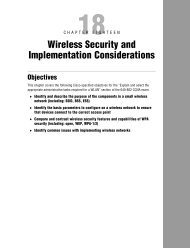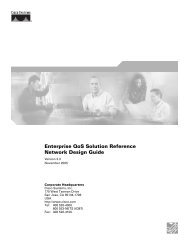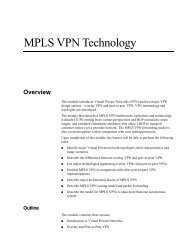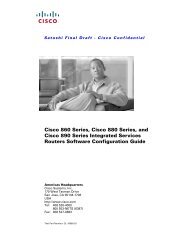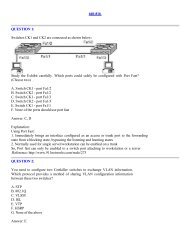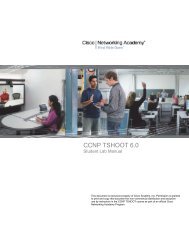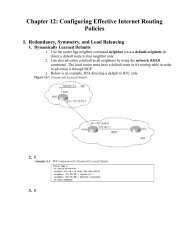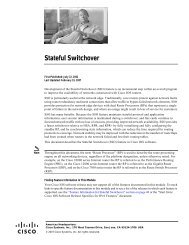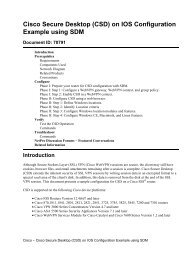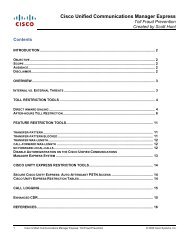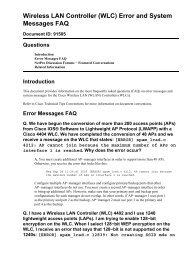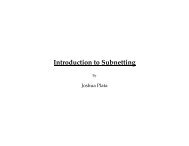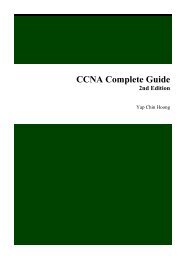Cisco Unified Contact Center Enterprise Solution Reference ...
Cisco Unified Contact Center Enterprise Solution Reference ...
Cisco Unified Contact Center Enterprise Solution Reference ...
Create successful ePaper yourself
Turn your PDF publications into a flip-book with our unique Google optimized e-Paper software.
Chapter 1 Architecture Overview<br />
Non-DNP Conferences<br />
Agent-to-Agent Conferences<br />
Transferring Conference Calls<br />
Conference Reporting<br />
OL-8669-05<br />
Conferences in a <strong>Unified</strong> CCE Environment<br />
Conferences to numbers not in the DNP or to numbers configured in the DNP with post-route set to No<br />
are allowed but do not result in a <strong>Unified</strong> ICM-routed call. In these scenarios, the PIM simply sends a<br />
call conference request directly to <strong>Cisco</strong> <strong>Unified</strong> CallManager and uses the dialed number from the<br />
conference dialog on the agent desktop. Call data is lost if the <strong>Unified</strong> ICM does not route the call. <strong>Cisco</strong><br />
recommends that any dialed number for a conference should have a match in the DNP, that it be marked<br />
for post-route, and that it have a DNP type that is allowed for the conferencing agent (based on the<br />
agent’s desk settings).<br />
If the conference is to a specific agent, then the agent requesting the conference must enter the agent ID<br />
into the conference dialog box. The DNP entry matching the dialed number (agent ID) must have DNP<br />
type equal to PBX. This causes the PIM to place the dialed number (agent ID) into the CED field before<br />
it sends the route request to the <strong>Unified</strong> ICM router. In the script editor, use the agent-to-agent routing<br />
node and specify the CED field as the location of the agent ID so that the <strong>Unified</strong> ICM router will route<br />
this call properly.<br />
Agent IDs should not match any of the extensions on the <strong>Cisco</strong> <strong>Unified</strong> CallManager cluster. If you<br />
begin all agent IDs with the same number and they all have the same length, you could set up a generic<br />
wildcard string that matches all agent IDs so that you need only one entry in the DNP for agent-to-agent<br />
routing.<br />
If your environment has multiple PIMs, then you must use an agent ID number plan to determine which<br />
PIM contains this agent. Agent IDs by themselves are not unique. Agent IDs are associated with a<br />
specific PIM and can be reused on other PIMs. By not repeating agent IDs across the enterprise and by<br />
setting up a consistent agent ID assignment plan (such as all PIM 1 agent IDs begin with a 1, all PIM 2<br />
agent IDs begin with a 2, and so on), you can parse the CED field in the script editor to determine which<br />
PIM contains the agent. The parsing may be done via a series of “if” nodes in the script editor or via a<br />
route-select node. The agent-to-agent node requires the PIM to be specified.<br />
In the event that the target agent is not in a ready state, the agent-to-agent script editor node allows<br />
alternative routing for the call.<br />
Transferring of conference calls is allowed with the same conditions as described in the section on<br />
Transfers in a <strong>Unified</strong> CCE Environment, page 1-26.<br />
After a conference call is completed, a call detail record for the original call leg will exist and a new call<br />
detail record will be opened for the new call leg. The two call records are associated with one another<br />
via a common call ID assigned by the <strong>Unified</strong> ICM. The time during the consultation call leg, and before<br />
the conference is completed, is considered as talk time for the conferencing agent.<br />
For more details, refer to the <strong>Unified</strong> CCE Reporting Guide, available online at <strong>Cisco</strong>.com.<br />
<strong>Cisco</strong> <strong>Unified</strong> <strong>Contact</strong> <strong>Center</strong> <strong>Enterprise</strong> 7.x SRND<br />
1-31



